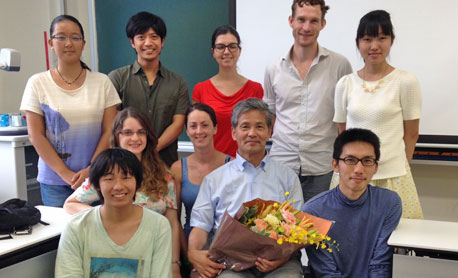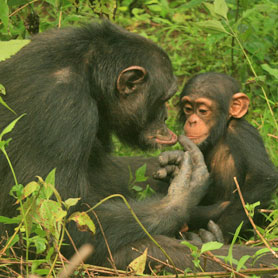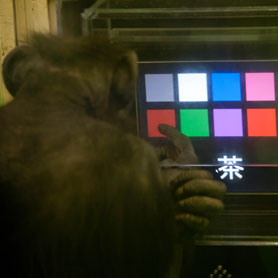Intensive Lecture:
Comparative Cognition
Thank you for joining the 3 days lecture in the main campus Kyoto.



Date
From Thursday 6 August to Saturday 8 August, 2015
Time
8:45 AM - 6:00 PM
(12:00-13:00 Lunch Break)
(12:00-13:00 Lunch Break)
Lecturer
Prof Testuro Matsuzawa
(Primate Research Institute, Kyoto University)
(Primate Research Institute, Kyoto University)
Venue
Room 1207, First Floor of Faculty of Integrated Human Studies Bldg,
Yoshida-South Campus of Kyoto University
総合人間学部棟2階1207教室
Yoshida-South Campus of Kyoto University
総合人間学部棟2階1207教室
Registration
Apply via KULASIS http://www.z.k.kyoto-u.ac.jp/freshman-guide/kulasis.
The closing date for applications is July 31 st 2015 at 5pm
The closing date for applications is July 31 st 2015 at 5pm
Introduction
An introduction to the evolution of human mind. Human mind is an evolutionary product so as the body. However, the mind does not remain in the fossil records such as bones and teeth. Therefore, we can access to the evolutionary origins of human mind by comparing the different species of living primates. This kind of approach is called "Comparative Cognitive Science (CCS)". CCS is an unique combination of Psychology and Primatology. CCS tries to give the answers to the fundamental questions such as "What is uniquely human?", "Where did it come from?, "How did we get here?, and "Where do we go?". This intensive lecture focuses on chimpanzees, our evolutionary neighbors. There is another course titled "Practice of chimpanzee study on site"that is held in the Primate Research Institute in the second week of August. Those who wish to take the course are recommended to take this one too.
Outline
This course covers selected areas of current research in comparative cognition. The focus is on behavioral studies with nonhuman animals, especially chimpanzees. Chimpanzees and humans share the latest common ancestor about 5 million years ago. Chimpanzees are the closest relatives of humans, and provide the key to understand the human nature.
Tentative Course Flows:
1) Historical context,
2)Wild chimpanzees: their life in the natural habitat,
3-1) Wild chimpanzees: the mother-infant relationship,
3-2) Wild chimpanzees: the use of tools,
4) Wild chimpanzees: the cultural tradition and the social propagation, focusing on the learning mechanism called "Education by master-apprenticeship",
5) Ai project: historical and ecological context,
6) Perception and cognition,
7) Learning,
8) Symbols,
9)Memory,
10) Imitation,
11) Social intelligence,
12) Brain functions underlying the cognitive function.
13) What is uniquely human?,
14) Conservation in the wild,
15) Animal welfare and the fundamental rights of the nonhuman animals.
Tentative Course Flows:
1) Historical context,
2)Wild chimpanzees: their life in the natural habitat,
3-1) Wild chimpanzees: the mother-infant relationship,
3-2) Wild chimpanzees: the use of tools,
4) Wild chimpanzees: the cultural tradition and the social propagation, focusing on the learning mechanism called "Education by master-apprenticeship",
5) Ai project: historical and ecological context,
6) Perception and cognition,
7) Learning,
8) Symbols,
9)Memory,
10) Imitation,
11) Social intelligence,
12) Brain functions underlying the cognitive function.
13) What is uniquely human?,
14) Conservation in the wild,
15) Animal welfare and the fundamental rights of the nonhuman animals.
Textbook
Matsuzawa et al. (2006) Cognitive development in chimpanzees (Springer)